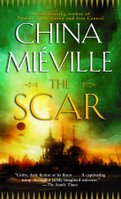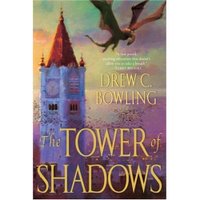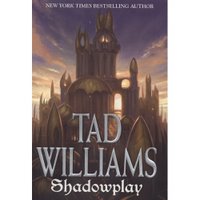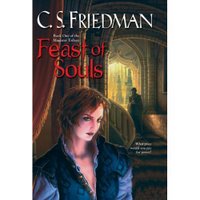
Here is the Q&A many of you have been waiting for!:-)
Many thanks to the good people at Del Rey Books and to China Miéville for making this interview possible. Once more, several questions comprising this Q&A were submitted by fans. You see, it pays to give it a shot!
Enjoy!
Patrick
--------------------
1- Without giving too much away, what can you tell us of UN LUN DUN?
Un Lun Dun is a book designed for younger readers - though of course I hope that adult readers will also enjoy it. It's a classic story of children from our world who find their way into another, odder place. The place is sort of a twisted city. It's a homage to that tradition of books like the Alice books, the Narnia books - cross-fertilised with the urban tradition of books like Michael de Larrabeiti's Borribles. It has a playful attitude to some of the assumptions often associated with Golden Child books. It also has plenty of monsters, of course, probably even more per page than most of my other books. And some of my very favourite I've invented ever. More than that, without spoilers, I cannot say.
2- Speaking of your newest novel, it begs the questions: Why a children's book?
I've always wanted to write a children's book. No book that I read as an adult, no matter how much I love it, has an impact on me the way books did when I was a child, and I think there's something very inspiring about that absolute fervour and abandon with which children read. It's also because the kind of fairy-tale logic I can use in a YA book I could never get away with in an adult book, so there's a real narrative freedom.
3- What do you feel is your strength as a writer/storyteller?
I don't think that's for me to say - I think writers are often the worst judges of what they're good or bad at. The thing I enjoy most, and that I _hope_ I do well, is monster-creation.
4- Your political beliefs regarding Marxism are well known, especially with the recent release of your book on the subject. How do these beliefs affect your writing?
I once said, in answer to this question, "both hugely and not at all". Because obviously like anyone who has strong opinions, my world-view, the kinds of concerns and interests I have, has a big impact on the kind of things I'm interested in examining in the fiction. But not at all, in the sense that the fiction has to be its own end. No matter what any writer's interested in - politically, socially, emotionally, scientifically, whatever - their fiction has to work as a story in its own terms, including for readers who don't agree or aren't interested in what I'm interested in.
What I hope is that for people who are interested in the same stuff I am - political and other - there's texture to the books, but for those who aren't, the story, and the monsters, keep them happy and turning the pages.
5- Your fans are eager to know when you will be returning to Bas-Lag?
I will definitely be returning to Bas-Lag, but I have a couple of books I want to write first. I suspect I'll be going back to Bas-Lag the rest of my writing life, but I want to intersperse it with non-Bas-Lag books. The worst thing possible would be to turn into a self-repeating machine.
6- In the past, you have never been shy about expressing your opinion concerning the genre. You have been critical of traditional, epic fantasy. What are your thoughts about the current state of the genre? Where would you like to see it go?
It seems to me fantastic literature at the moment is in a very healthy state. What I hope is that we continue that trend, and that people continue to experiment.
I'm interested to see more fantastic fiction written in non-traditional prose styles - drawing on avant-garde techniques at the sentential level of prose, as well as structure, for example. Of course you wouldn't want that all the time, but even if it doesn't always work, it's always worth experimenting. Trying new stuff.
7- Now that many purists and aficionados consider you one of the best fantasy authors in the world, is there added pressure when it comes down to writing a new novel?
I'm ludicrously flattered by how you put the question. In fact I feel great pressure every time I write anything. I'd love it if everyone loved everything I ever wrote, but of course it won't happen, and I think in the long term it's worth risking that - even knowing that - for the sake of not always doing the same thing. You ask an indulgence of your readers that way, no question, but I hope they'll think it's worth it in the long term, even if they don't always love each individual book.
In this case, obviously, the fact that it's a YA book is a major change, and I hope people think it's worked.
8- What was the spark that generated the idea which drove you to write PERDIDO STREET STATION, THE SCAR, KING RAT and IRON COUNCIL in the first place?
Monsters.
9- Were there any perceived conventions of the fantasy genre which you wanted to twist or break when you set out to write those novels?
In the first few years of my writing I spoke quite often about this sort of thing. Most of my opinions on that topic are public record, and I think there's a real danger of me becoming a complete bore about it, particularly fairly simple and uncontroversial opinions which can sound very self-important. I'm reminded of Alan Alda's comedian in 'Crimes and Misdemeanors' endless repetition of his trite mantra 'If it bends, it's funny: if it breaks, it's not funny', each time thinking he's saying something remarkable and profound. So I hope you'll forgive me ducking the question in an effort not to become too much of a self-parody.
10- Your books have garnered what can best be described as a cult following. However, many doubt that they will ever become "mainstream." With that in mind, how rewarding is it to realize how successful the novels have been worldwide and continue to be to this day?
Of course any success is incredibly rewarding, and a success that allows you to write full-time is as much as I, or any writer I know, could possibly hope for. I've been extremely lucky.
11- You have won the Arthur C. Clarke Award, the British Fantasy Award, and you were a finalist for the Hugo Award, the Philip K. Dick Award, the World Fantasy Award and the British Science Fiction Award. How important are those accolades to you?
It's incredibly flattering to have the books acknowledged by juries and/or prize committees. Of course these things are always subjective, so I think you'd be very foolish to think that if you win over another book, your work is necessarily 'better' - that would be ludicrous. And of course I disagree with the decisions of prize-juries easily often enough to know that they're not infallible. But it's always a huge honour and kick to win, even with those - perfectly true - caveats.
12- Honestly, do you believe that the speculative fiction genre will ever come to be recognized as veritable literature? Truth be told, in my opinion there has never been this many good books/series as we have right now, and yet there is still very little respect (not to say none) associated with the genre.
Probably not, unfortunately. I hope I'm wrong, and certainly there's more of an open-mindedness now than there has been for a while, but these things are often cyclical.
13- Characters often take a life of their own. Which of your characters did you find the most unpredictable to write about?
I'm never surprised by my own characters. I just don't write that way. Sometimes they change a lot in the development of the book, but I don't tend to feel like they're escaping me. I know plenty of magnificent writers who do write, and feel, that way, but I'm not one of them.
14- Tolkien -- Middle Earth meets Middle England: This article did not sit well with many readers, many of whom claim that you came out as pompous in that text. Some wonder how you could make such claims about Tolkien's writing and the clichés it has spawned, while Michael Moorcock's novels suffer from the very same issues. What would you respond to such postulations?
You're right, plenty of people hated that article (which had a life of its own that startled me - that's the internet effect. It was written, don't forget, intended as a humorous polemical critique for a relatively small audience) and there are at least two reasons. One is that they disagree: the other is that they didn't like the tone. Of course I don't like it if people think I'm pompous, partly just because I don't relish that idea, and partly because it can mean that the actual arguments don't even get addressed. If people ever do want to argue about it, I think it's very important to establish which of those two criticisms - or both - is being levelled. To criticise the piece on grounds of pomposity, for example, because someone disagrees with the specific claims, which has sometimes happened, seems to me something of a category error.
But in fact I prefer not to rehash that ground. I've said my piece, my opinions haven't changed and they're very easy to find, but I also blush rather at some of my earlier formulations and think that my critique of Tolkien is neither new nor particularly interesting, and there's not much point reiterating it, so (for reasons similar to those in my answer to question 9), I don't like going over that - I've already done so far too many times. It's hardly radical to criticise him these days.
Much more interesting to me recently is the question of which elements of Tolkien's work, criticisms notwithstanding, I admire and/or find interesting: his obsessiveness; his tragedianism; his pathological relationship to war; and above all his hostility to allegory. These seem to me very fecund areas for consideration, even perhaps inspiration.
(One thing I would add parenthetically is that I don't understand the point about Moorcock, whose novels seem to me predicated on extremely different moral, political and aesthetic foundations than Tolkien's. Apologies for not understanding.)
15- Anything you wish to add?
Only, I guess, that if anything I'm more nervous about people's responses to the illustrations even than the text of ULD, because I've had books published before, but never put art out there in the same way. I would hate it if people thought it was a vanity project and that the pictures massively detracted from the book - I want to stress that I never insisted my illustrations be used in the book. I hope people like them, but if not, I hope they don't think they're lamentable.
Many thanks again for accepting to do this interview. I wish you continued success with your writing career and best of luck for the release of UN LUN DUN.
Thanks very much, Patrick!
C.

















